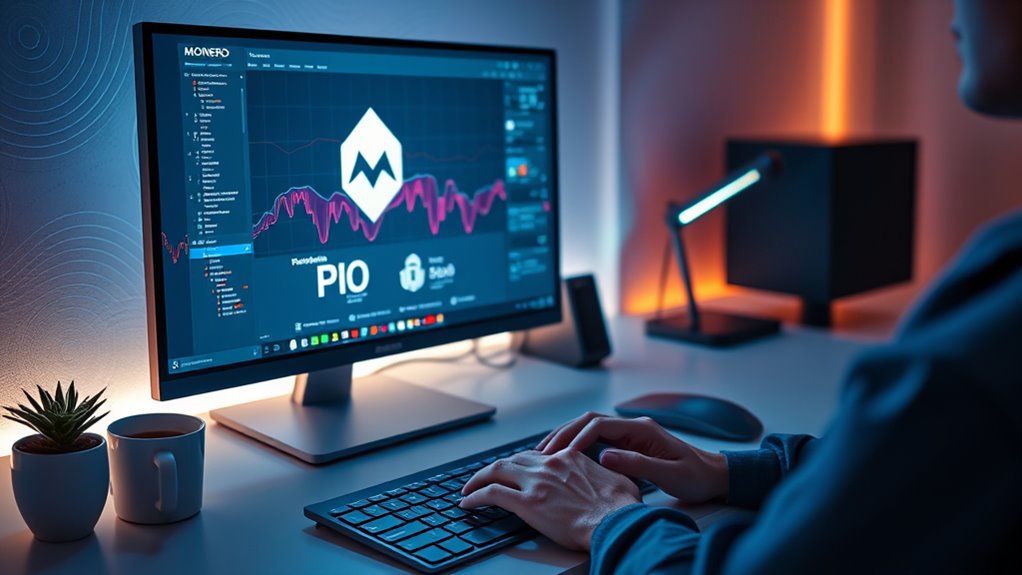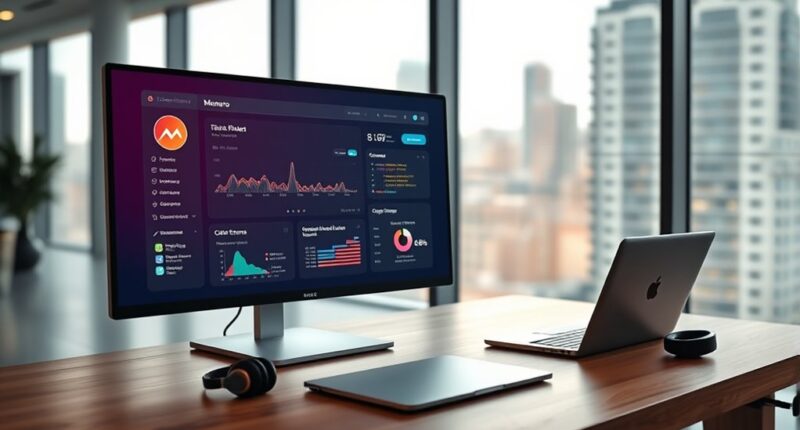Running your own Monero node in the cloud is a smart way to boost your privacy without needing technical skills. It lets you control your transaction data, verify transactions independently, and prevent third-party interference. Cloud providers make setup simple, guiding you through the process to get your node up and running quickly. Plus, combining it with encrypted messaging strengthens your security even more. Keep exploring to discover how you can easily enhance your privacy and control.
Key Takeaways
- Running a Monero node in the cloud enhances privacy by allowing full control over transaction data without relying on third-party nodes.
- Cloud providers offer simple, guided setup processes that require no advanced technical skills, making node operation accessible.
- Operating your own node ensures transaction privacy and untraceability, protecting your digital footprint from external surveillance.
- Supporting your own node contributes to network decentralization, strengthening Monero’s censorship resistance and security.
- Combining a cloud node with encrypted messaging maximizes privacy and security, all without the need for a technical background.

Have you ever wondered how to better protect your personal information in today’s digital world? With increasing concerns over privacy, more people are seeking ways to safeguard their data from prying eyes. Running your own Monero node in the cloud offers a powerful solution, giving you control over your transactions and privacy. Unlike relying on third-party services, hosting your node ensures that your financial activity remains private and under your control. It’s a straightforward process, even if you don’t have a tech degree, thanks to user-friendly cloud hosting platforms. Setting up a Monero node in the cloud means you’re not dependent on external nodes, which can often compromise your data or introduce privacy risks. Instead, you operate your own, directly connecting to the Monero network, ensuring your transactions stay private and untraceable.
One of the key benefits of running your own node is the empowerment it provides over data sovereignty. When you control your node, you’re not subject to the policies or potential surveillance of third-party providers. Your transaction data stays within your control, and you can verify it yourself, fostering trust and transparency. This setup means no one else can interfere or access your private information, which is critical in a world where data breaches and privacy violations are common. Furthermore, a personal node supports encrypted messaging, allowing you to communicate securely with others. Encrypted messaging ensures that your conversations are unreadable to outsiders, further enhancing your privacy shield. When combined with a Monero node, encrypted messaging becomes part of a thorough privacy strategy, making sure your digital footprint stays minimal and secure. Additionally, the use of privacy-focused protocols like the Law of Attraction can enhance your overall mindset about digital security and personal empowerment.
Getting started is easier than you might think. Many cloud providers offer simple, guided setups tailored for beginners. You don’t need to be a coding expert—just follow step-by-step instructions, and you’ll have your own Monero node up and running in no time. Once operational, your node will sync with the Monero blockchain, allowing you to send and receive transactions privately. You can also verify your transactions independently, confirming their authenticity without relying on third parties. This setup not only boosts your privacy but also contributes to the overall health and decentralization of the Monero network. By running your own node, you actively participate in maintaining a censorship-resistant and privacy-focused ecosystem. In a digital age where privacy is increasingly under threat, taking control by running your own Monero node in the cloud gives you peace of mind and a stronger grip on your personal information.
Frequently Asked Questions
How Secure Is Running a Monero Node in the Cloud?
Running a Monero node in the cloud offers good security, but you should be aware of potential cloud vulnerabilities. Your node security depends on the cloud provider’s measures and your own configurations. While cloud hosting can be safe, it’s essential to keep software updated and use strong security practices. Be aware that cloud vulnerabilities might expose your node or data, so choose a reputable provider and regularly monitor your setup for risks.
What Are the Ongoing Costs of Hosting a Monero Node?
Hosting a Monero node involves ongoing costs like hardware expenses for the server and electricity bills. You’ll need reliable hardware, which might be a one-time investment or upgrade over time, and you’ll pay for electricity to keep the node running smoothly. Monthly costs vary based on your setup and usage, but generally, expect to spend on maintaining hardware and covering electricity expenses to keep your node active and secure.
Can I Run a Monero Node on a Mobile Device?
Running a Monero node on a mobile device isn’t ideal due to mobile limitations, battery impact, and processing power constraints. While technically possible, it can drain your battery quickly, slow your device, and disrupt daily use. You need to weigh the benefits of decentralization and privacy against these mobile limitations and battery impacts. For consistent, reliable operation, a dedicated server or cloud setup remains the smarter choice.
How Does Running My Own Node Enhance Privacy Compared to Exchanges?
Running your own Monero node enhances privacy by providing decentralized verification, meaning you don’t rely on third parties to confirm transactions. Unlike exchanges that hold your funds and data, your node keeps your transaction history private and secure. This setup prevents exposure of your financial activity, giving you enhanced privacy and control over your transactions. By operating your own node, you ensure your financial privacy remains intact and less vulnerable to external surveillance.
What Technical Skills Are Necessary to Set up a Monero Node?
Setting up a Monero node is like building a sturdy bridge—you’ll need some technical prerequisites, such as basic command-line skills and familiarity with system management. The setup complexity varies, but generally, you should understand server configurations and network settings. While it’s straightforward for tech-savvy users, beginners might find it challenging. Don’t worry—step-by-step guides and community support can turn this task into a manageable project.
Conclusion
Running your own Monero node in the cloud is like planting a seed for your digital privacy. Just as a tiny sapling grows into a sturdy tree, your setup strengthens your control and security over your transactions. Remember when I started, I felt like I was building a fortress piece by piece—now, my privacy feels unbreakable. With this simple step, you’re taking the reins and growing your financial independence every day.









